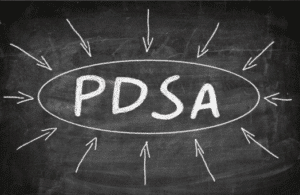Guest Post
How does Deming apply to the cybersecurity world? This guest post by Brian Barnier shows how systems thinking can help cybersecurity professionals outthink the enemy. (This is part 2 of a 2-part series.)
Read MoreIn this guest post, Brian Barnier takes the Deming philosophy into the cyber security world. Inappropriate methods applied to cyber security problems are like flaws in a building’s engineering: they set people up for failure and burnout. Deming’s System of Profound Knowledge is the antidote, but few understand how it applies to cybersecurity.
Read MoreGuest post by Dr. Doug Stilwell, Assistant Professor Drake University: Now more than ever, I wish Dr. Deming was still with us, for even at age 64 I have so many burning questions I’d like to ask him, driven by the extreme frustration I feel about the “state of things” in our world.
Read MoreIn most organizations, managers’ challenges range from doing more with less to motivating employees. This is causing managers to report “burnout” on a massive scale. To solve such challenges effectively, means identifying their underlying causes which, the authors find, are seldom addressed.
Read MoreAn appreciation for a system is one of the four interrelated components that form Dr. Deming’s System of Profound Knowledge. In his guest post, Drake University Professor, Dr. Doug Stilwell, explores how adopting a systems-thinking approach can help in our efforts to eradicate COVID-19.
Read MoreGuest Post by Dr. Doug Stilwell, Assistant Professor, Educational Leadership, Drake University. Over the past couple of years, I have been informally researching the relationship between the food we eat and our health. Over the course of my learning, I have made a connection with organizational effectiveness. At first blush, this may seem like quite […]
Read MoreGuest Post by Liz Schupp, German Teacher, Waukee High School and Educational Leadership Graduate Student of Dr. Doug Stilwell, Drake University.
Best efforts are essential when they are guided by principles backed in research and focused on continual improvement. When we simply do our best without what Deming refers to as a system of profound knowledge, we aren’t going to make meaningful improvements.
Read MoreGuest Post by Amy Ripperger, Instructional Coach, Indianola CSD, Educational Leadership Graduate Student, Drake University. If we want our students to reach their fullest potential, then we, the educators, must work to reach ours. But we have to be careful here, for at the heart of continual improvement lies an acceptance that we won’t ever “arrive.” We must be okay with this. Perfection isn’t the goal, continual improvement is.
Read MoreGuest post by Doug Stilwell, Drake University. There are indeed many reasons change efforts fail. But we can avoid one of those reasons by taking “small jumps;” breaking down important change/improvement efforts into manageable and measurable steps so that the daunting size and complexity of initiatives are not the cause of failure.
Read MoreGuest Post by Dr. Doug Stilwell, Drake University. During this time of COVID-driven isolation and loneliness, and the accompanying challenges to mental health, finding and operationalizing systematic methods to help people belong and recognize their sense of belonging – even after COVID is over – may be more important than ever for leaders to address.
Read More











